|
|
|
Sort Order |
|
|
|
Items / Page
|
|
|
|
|
|
|
| Srl | Item |
| 1 |
ID:
140417


|
|
|
|
|
| Summary/Abstract |
Three decades of financial crises culminating in the global financial crisis have prompted the development of multilayered global financial governance. This article examines the relationship between the global and regional layers by analyzing the case of the global and ASEAN+3 financial safety nets. Making use of regime theory, we examine the evolution of the characteristics, main institutions, goals, and behavioral expectations of these two nets. The article argues that the ASEAN+3 regional financial safety net, which was mostly developed following the East Asian financial crisis of 1997, complements rather than undermines the global financial safety net. Similar characteristics, goals, and behavioral expectations underpin this complementarity.
|
|
|
|
|
|
|
|
|
|
|
|
|
|
|
|
| 2 |
ID:
145108
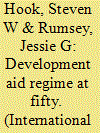

|
|
|
|
|
| Summary/Abstract |
The paper considers the status of the global development aid regime, which originated in 1960 and remains the primary conduit for the delivery of Official Development Assistance (ODA) to impoverished states. We begin by situating the inquiry in regime analysis, which emerged in the 1970s to explain patterns of interstate cooperation that were not captured by existing paradigms of world politics. We then suggest a means by which the cohesion of a given transnational regime may be tested over time. Specifically, we trace the ODA regime's adherence to its own procedural standards between 1961 and 2011 and find that, while the ODA regime has consistently failed to reach its quantitative targets, it has surpassed its qualitative targets, such as the ratio of grants to loans, since the 1990s. Finally, we examine aid transfers from non-DAC sources and consider to what extent this activity can be reconciled with the ODA regime's practices in their current form. We also question whether the challenges posed by non-DAC donors reflect regime erosion and, if so, whether this can be attributed to the decline of its leading member (the United States), as theories of hegemonic stability expect.
|
|
|
|
|
|
|
|
|
|
|
|
|
|
|
|
| 3 |
ID:
187306
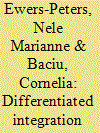

|
|
|
|
|
| Summary/Abstract |
An extensive size of literature has investigated the multifaceted dimensions of differentiated integration in Europe. Notwithstanding, we know little about the drivers and strategic underpinnings of differentiated integration in the high politics areas concerning national and international security, such as foreign policy, security and defence. What explains the variation in states’ foreign policy preferences of integration in multilateral security orders? In this article, we seek to explain this variation by putting forward a two-level argument. First, we claim that states adopt a genuine role player conception underpinned by a mixture of relative gains, absolute gains, and normative factors. Second, we propose a novel operational model to examine member states’ efforts for cooperation and integration in the security and defence domain based on their threat perceptions, level of ambitions, strategic partnerships, military spending, and troop deployments. To illustrate our argument, we employ a comparative case study design, examining four countries: Germany, France, Ireland and Romania. The article finds that the analysed countries play conspicuous roles in the Euro-Atlantic security order. France takes the role of an agile power-projector, Germany embraces the role of a global responsibility taker, Ireland plays the role of a peacekeeping neutral, and Romania of a small regional power.
|
|
|
|
|
|
|
|
|
|
|
|
|
|
|
|
| 4 |
ID:
104444
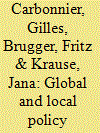

|
|
|
|
|
| Publication |
2011.
|
| Summary/Abstract |
This article examines the most significant international policy responses that seek to address the resource trap and spur development in resource-rich, but fragile states. It applies a regime theoretical framework to assess recent multistakeholder initiatives within the extractive sector by focusing on the processes through which they seek to alter the behavior of public and private organizations. Based on a review of the Nigerian and Azeri cases, the article finds that civil society often does not have the capacity to live up to the high expectations placed on it by these initiatives. The effectiveness and eventual success of multistakeholder initiatives in the extractive sector require exploring alternative pathways to affect behavior of key actors. Stronger market incentives and regulation can provide the conditions required for extractive activities to result in positive development outcomes.
|
|
|
|
|
|
|
|
|
|
|
|
|
|
|
|
| 5 |
ID:
074666
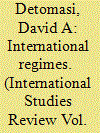

|
|
|
|
|
| Publication |
2006.
|
| Summary/Abstract |
Accounting and financial scandals of unprecedented scale have recently occurred in the United States, Europe, and elsewhere. Much of the cause for these scandals has been attributed to the poor corporate governance standards practiced by the offending companies, leading researchers to re-examine how corporate governance affects economic development. One topic receiving significant research attention has been whether national corporate governance systems are likely to converge, what form that convergence may take, and what barriers currently inhibit convergence. This essay argues that the tools of regime theory hold significant potential for helping to structure empirical inquiry into the process of corporate governance convergence. It then draws upon the recent experience of Western corporate governance systems to illustrate how a consensus on norms, values, and principles in the issue area of corporate governance is emerging. The essay concludes by drawing out the implications of the developing corporate governance regime for emerging market economies and the general topic of global governance. It also poses questions for continued empirical research in the area of corporate governance and international relations.
|
|
|
|
|
|
|
|
|
|
|
|
|
|
|
|
| 6 |
ID:
077062
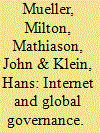

|
|
|
| 7 |
ID:
114642
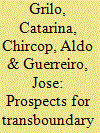

|
|
|
|
|
| Publication |
2012.
|
| Summary/Abstract |
Transboundary marine protected areas have been proposed in East Africa to tackle threats to marine biodiversity, meet international MPA targets, promote tourism, and contribute to poverty reduction. This article examines what may drive, facilitate, or constrain states in creating a regime for transboundary MPAs. In East Africa, a regime between Mozambique and Tanzania is not yet formed and may be indefinitely delayed due to oil prospecting and exploration. There is, however, a well-developed regime between Mozambique and South Africa that has resulted in the two adjoining MPAs being declared the first transboundary MPA on the continent.
|
|
|
|
|
|
|
|
|
|
|
|
|
|
|
|
| 8 |
ID:
168799


|
|
|
|
|
| Summary/Abstract |
More than three decades after the concept of international regimes was introduced, the study of why and how states may choose to cooperate, particularly around security, remains contested. While the field has evolved considerably over that time, there remain significant puzzles in the literature concerning the emergence of different types of security regimes. We aim to address these issues by developing the concept of a tacit security regime (TSR) literature. We define a TSR as an interest-based, limited, and informal mechanism of cooperation between states for the purpose of deconflicting their respective interests over a specific security issue. We illustrate the usefulness of our concept in the two contemporary cases of Russian-Israeli and Russian-Turkish security cooperation over the Syrian crisis (2015–2018).
|
|
|
|
|
|
|
|
|
|
|
|
|
|
|
|
|
|
|
|
|